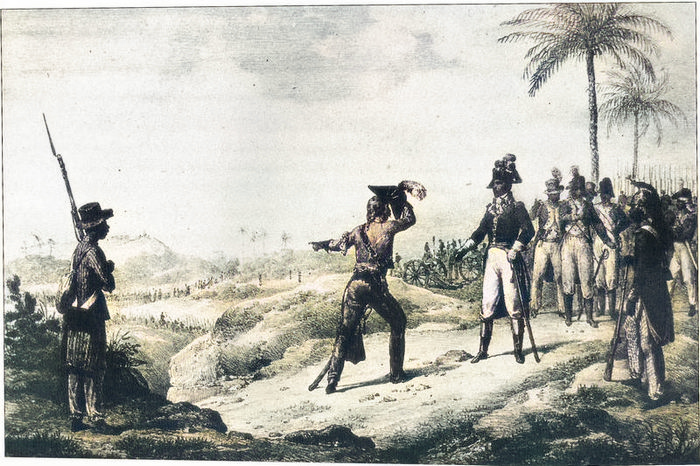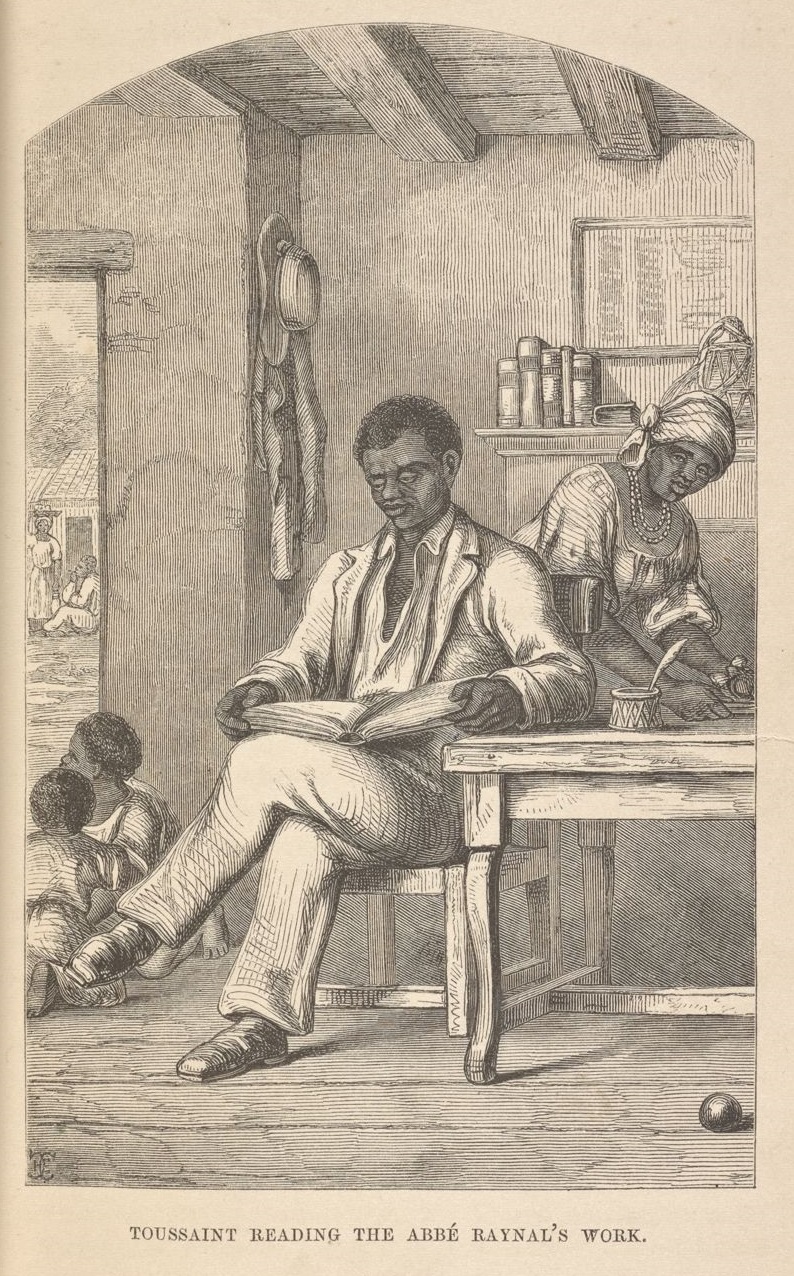|
Armée Indigène
The Indigenous Army (french: link=no, Armée Indigène), also known as the Army of Saint-Domingue (french: link=no, Armée de Saint-Domingue) or Lame Endijèn in Haitian Creole, was the name bestowed to the coalition of anti-slavery rebels who fought in the Haitian Revolution. Encompassing both black slaves, maroons, and affranchis (black and mulatto freedmen alike), the rebels were not officially titled the Armée indigène until January 1803, under the leadership of then-general Jean-Jacques Dessalines.Fombrun, Odette Roy"History of the Haitian Flag of Independence" Flag Heritage Foundation.org. Accessed February 22, 2018. Predated by insurrectionists such as François Mackandal, Vincent Ogé and Dutty Boukman, Toussaint Louverture, succeeded by Dessalines, led, organized, and consolidated the rebellion. The now full-fledged fighting force utilized its manpower advantage and strategic capacity to overwhelm French troops, ensuring the Haitian Revolution was the most successful ... [...More Info...] [...Related Items...] OR: [Wikipedia] [Google] [Baidu] |
Saint-Domingue
Saint-Domingue () was a French colony in the western portion of the Caribbean island of Hispaniola, in the area of modern-day Haiti, from 1659 to 1804. The name derives from the Spanish main city in the island, Santo Domingo, which came to refer specifically to the Spanish-held Captaincy General of Santo Domingo, now the Dominican Republic. The borders between the two were fluid and changed over time until they were finally solidified in the Dominican War of Independence in 1844. The French had established themselves on the western portion of the islands of Hispaniola and Tortuga by 1659. In the Treaty of Ryswick of 1697, Spain formally recognized French control of Tortuga Island and the western third of the island of Hispaniola. In 1791, slaves and some Dominican Creoles took part in the Vodou ceremony Bois Caïman and planned the Haitian Revolution. The slave rebellion later allied with Republican French forces following the abolition of slavery in the colony in 1793, althoug ... [...More Info...] [...Related Items...] OR: [Wikipedia] [Google] [Baidu] |
Siege Of Port-au-Prince (1803)
The siege of Port-au-Prince was an engagement that took place during the Haitian Revolution. Siege In October, the rebel army commanded by General Dessalines Dessalines ( ht, Desalin) wrongly referred to as ''Marchand-Dessalines'' ( ht, Machan Desalin), is a commune in the Artibonite department of Haiti. It is named after Jean-Jacques Dessalines, a leader of the Haitian Revolution and the first ru ..., a force of 22,000 men, laid siege to the city of Port-au-Prince. After a month of siege and several attacks, the French troops commanded by Lavalette evacuate the place and retreat to the Cap-Français. Notes Bibliography * * {{DEFAULTSORT:Siege of Port-au-Prince (1803) Conflicts in 1803 Port-au-Prince 1803 Port-au-Prince 1803 Haitian Revolution 1803 in France 1803 in the Caribbean October 1803 events History of Port-au-Prince ... [...More Info...] [...Related Items...] OR: [Wikipedia] [Google] [Baidu] |
Jacques Maurepas
Jacques Maurepas (died 1802) was the commander of the town of Port-de-Paix in the northeast of St. Domingue which is now Haiti at the time when Napoleon sent a large army led by his brother-in-law general Charles Leclerc to overthrow Toussaint Louverture. Before the arrival of Leclerc, Louverture had ordered Maurepas to make the most vigorous resistance to all vessels which should appear before Port-de-Paix, and, in case he was not strong enough (having only half of a brigade), burn the city to the ground and afterward withdraw to the mountain, take with him ammunition of all kinds; there to defend himself to the death. On February 12, 1802, suspecting the French expedition was about to land in the city, Maurepas burned the city down and retreated to a nearby mountain named ''Les Trois Pavillons''. When French General Humbert arrived, he saw the city in flames. On February 13, Humbert marched against Maurepas, but was completely defeated. When Charles Leclerc heard this terrible ... [...More Info...] [...Related Items...] OR: [Wikipedia] [Google] [Baidu] |
Magloire Ambroise
Magloire Ambroise (Jacmel, Saint-Domingue, 1774 - Port-au-Prince December 7, 1807), was a hero of the Haitian Independence. His military career began in the colonial army. Life During the War of Knives between Toussaint Louverture in the North against the mulattoes leader André Rigaud in the South (1799–1801), Magloire saved the lives of hundred of respected families in Jacmel. As a result, he was regarded as a hero by the people of that town at this time. In 1802, Jean-Jacques Dessalines named him commander of Jacmel. However, the French troops captured the town as they did in many towns in the country at that time. In 1803, Magloire Ambroise put a siege in Jacmel. The siege was over on October 17, 1803, when the French troops surrendered and were allowed by Magloire's troops to board a British warship. In 1804, Magloire Ambroise was one of the generals who signed the independence act. In February 1806, by the order of Dessalines, Magloire Ambroise received Francisco de Mi ... [...More Info...] [...Related Items...] OR: [Wikipedia] [Google] [Baidu] |
Étienne Élie Gerin
Etienne Elie Gérin (December 19, 1757 – January 18, 1810) was a Haitian military and politician. He was a general of the Armée indigène and later the Haitian army. During the reign of Jean-Jacques Dessalines, he served as the minister of war. On October 11, 1806, he issued a monarch's obedience and joined the troops centered around Henri Christophe, Alexandre Pétion Alexandre Sabès Pétion (; April 2, 1770 – March 29, 1818) was the first president of the Republic of Haiti from 1807 until his death in 1818. He is acknowledged as one of Haiti's founding fathers; a member of the revolutionary quartet that ... and Laurent Férou seeking to overthrow Dessalines' empire. After the murder of Dessalines (17 October 1806), along with the other leaders of the rebellion, he decided about the need to pass a new constitution and to call the Constituent Assembly He became a deputy in the assembly but did sign the text of the constitution, because he was on the day of its adopt ... [...More Info...] [...Related Items...] OR: [Wikipedia] [Google] [Baidu] |
François Capois
François Capois (or François Cappoix; 1766 – October 8, 1806, nicknamed Capois-La-Mort, also Cappoix-la-Mort, meaning "Capois-Death") was a Haitian officer in the Haitian Revolution (1791–1794) for independence from France. He was born in Port-de-Paix, Saint-Domingue on the island of Hispaniola, on the plantation of Laveaux/Lapointe. His name was a transformation of the name ''cappouet'', owner of the plantation. Military career His military career began in 1793 after a visit with independence leader Toussaint Louverture at Port-de-Paix. Then under the colonel Jacques Maurepas he was a member of the 9th brigade. His rank in the army changed quickly, first to Lieutenant, then to Captain of the 3rd Battalion. He participated under general Jacques Maurepas against all expeditions and invasions in the north-eastern region of the island. Capois is mostly known for his extraordinary courage and especially his herculean bravery at the Battle of Vertières in which the Fren ... [...More Info...] [...Related Items...] OR: [Wikipedia] [Google] [Baidu] |
Henri Christophe
Henri Christophe (; 6 October 1767 – 8 October 1820) was a key leader in the Haitian Revolution and the only monarch of the Kingdom of Haiti. Christophe was of Bambara ethnicity in West Africa, and perhaps of Igbo descent. Beginning with the slave uprising of 1791, he rose to power in the ranks of the Haitian revolutionary military. The revolution succeeded in gaining independence from France in 1804. In 1805 he took part under Jean-Jacques Dessalines in the capturing of Santo Domingo (now Dominican Republic), against French forces who acquired the colony from Spain in the Treaty of Basel. After Dessalines was assassinated, Christophe retreated to the Plaine-du-Nord and created a separate government. On 17 February 1807, he was elected president of the State of Haiti, as he named that area. Alexandre Pétion was elected president in the south. On 26 March 1811, Christophe created a kingdom in the north and was later proclaimed Henry I, King of Haïti. He also created a n ... [...More Info...] [...Related Items...] OR: [Wikipedia] [Google] [Baidu] |
Alexandre Pétion
Alexandre Sabès Pétion (; April 2, 1770 – March 29, 1818) was the first president of the Republic of Haiti from 1807 until his death in 1818. He is acknowledged as one of Haiti's founding fathers; a member of the revolutionary quartet that also includes Toussaint Louverture, Jean-Jacques Dessalines, and his later rival Henri Christophe. Regarded as an excellent artilleryman in his early adulthood, Pétion would distinguish himself as an esteemed military commander with experience leading both French and Haitian troops. The 1802 coalition formed by him and Dessalines against French forces led by Charles Leclerc would prove to be a watershed moment in the decade-long conflict, eventually culminating in the decisive Haitian victory at the Battle of Vertières in 1803. Early life Pétion was born "Anne Alexandre Sabès" in Port-au-Prince to Pascal Sabès, a wealthy French father and Ursula, a free mulatto woman, which made him a ''quadroon'' (a quarter African ancestry). Like ... [...More Info...] [...Related Items...] OR: [Wikipedia] [Google] [Baidu] |
Jean-Jacques Dessalines
Jean-Jacques Dessalines (Haitian Creole: ''Jan-Jak Desalin''; ; 20 September 1758 – 17 October 1806) was a leader of the Haitian Revolution and the first ruler of an independent First Empire of Haiti, Haiti under the Constitution of Haiti, 1805 constitution. Under Dessalines, Haiti became the first country in the Americas to permanently abolish slavery. He led a genocidal campaign against white Haitians in 1804. Initially regarded as governor-general, Dessalines was later named Emperor of Haiti as Jacques I (1804–1806) by generals of the Haitian Revolution Army and ruled in that capacity until being assassinated in 1806. He has been referred to as the father of the nation of Haiti. Dessalines served as an officer in the French army when the colony was fending off History of Spain (1700–1810), Spanish and Kingdom of Great Britain, British incursions. Later he rose to become a commander in the revolt against France. As Toussaint Louverture's principal lieutenant, he led man ... [...More Info...] [...Related Items...] OR: [Wikipedia] [Google] [Baidu] |
Toussaint Louverture
François-Dominique Toussaint Louverture (; also known as Toussaint L'Ouverture or Toussaint Bréda; 20 May 1743 – 7 April 1803) was a Haitian general and the most prominent leader of the Haitian Revolution. During his life, Louverture first fought against the French, then for them, and then finally against France again for the cause of Haitian independence. As a revolutionary leader, Louverture displayed military and political acumen that helped transform the fledgling slave rebellion into a revolutionary movement. Louverture is now known as the "Father of Haiti". Louverture was born enslaved on the French colony of Saint-Domingue, now known as Haiti. He was a devout Catholic who became a freeman before the revolution and, once freed, identified as a Frenchman for the greater part of his life. During his time as a freeman he attempted to climb the highly stratified social ladder on the island, combatting racism whilst gaining and losing much wealth while working as ... [...More Info...] [...Related Items...] OR: [Wikipedia] [Google] [Baidu] |





